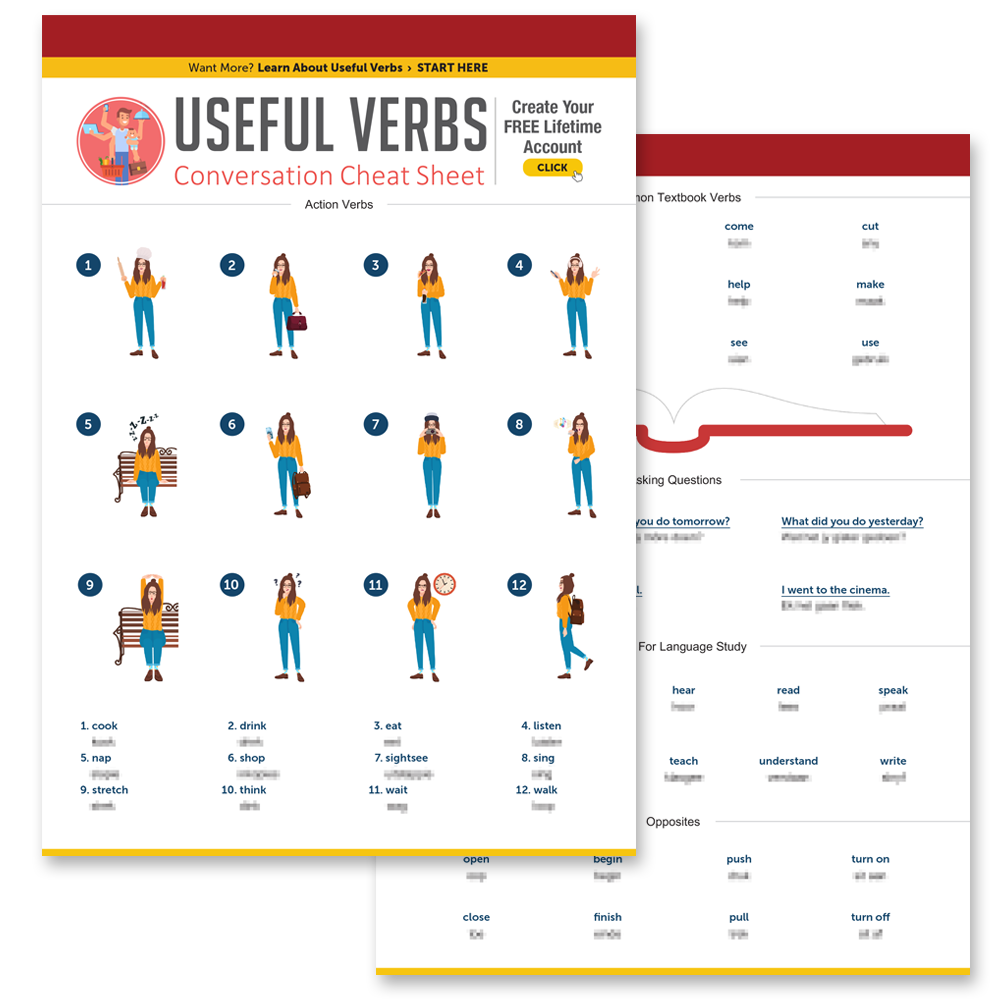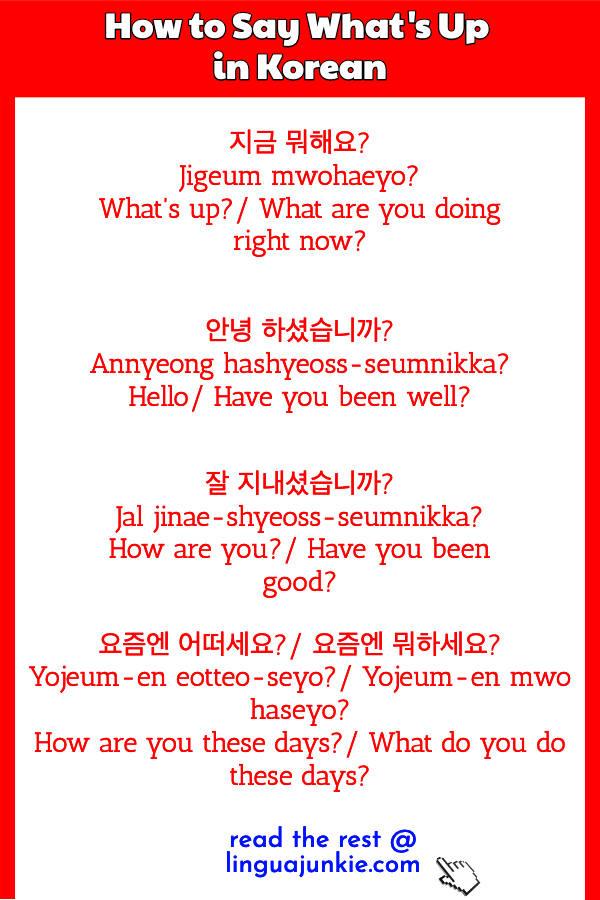How do you say what’s up in Korean?
Well, stick around.
This guide will teach you 13+ ways to say what’s up and how are you in Korean. All kind of fun variations. So, take a look below.
 | Want FREE Korean Vocab & Phrase PDF Lessons? Click Here to Get 20+ FREE PDF Lessons from KoreanClass101 (Korean learning program.) |
1. 지금 뭐해요?
- Jigeum mwohaeyo?
- What’s up?/ What are you doing right now?
This the most common way to say whats up in Korean….and is an everyday phrase for Koreans. You can easily notice this in movies or dramas whenever a couple starts dating. After all, always being curious about what your partner is up to is quite understandable, right?
The informal version is 지금 뭐해?
× Example:
- 너 지금 뭐해? 같이 밥 먹을래?
- Neo jigeum mwohae? Gat-ji bab meogeullae?
- What are you doing right now? Wanna grab a meal together?
2. 안녕 하셨습니까?
- Annyeong hashyeoss-seumnikka?
- Hello/ Have you been well?
This is the most common greeting in Korea. It is a polite and formal expression that you can use to greet elders, strangers and overall anyone older or in a higher position than you. It is considered rude if you don’t greet someone you know, especially the local ahjummas.
The informal versions are 안녕하십니까?, 안녕하세요 and 안녕.
× Example:
- 안녕하십니까 교수님?
- Annyeong hashimnikka gyosu-nim?
- Have you been well, professor?
3. 잘 지내셨습니까?
- Jal jinae-shyeoss-seumnikka?
- How are you?/ Have you been good?
Although the wording is similar to the first one, this sentence is a formal ‘how are you’ greeting. Preferably used to ask about someone’s well-being when you haven’t seen them in a long time.
The informal versions are 잘 지내셨어요?, 질 지내?.
× Example:
- 삼촌 오랜만이네요. 잘 지냈어요?
- Samchon oraen-mani-neyo. Jal jinaesseo-yo?
- It’s been a long time, uncle. How are you?
4. 요즘엔 어떠세요?/ 요즘엔 뭐하세요?
- Yojeum-en eotteo-seyo?/ Yojeum-en mwo haseyo?
- How are you these days?/ What do you do these days?
Again, when you are unaware of someone’s current whereabouts, you can ask them this. Usually it goes a little deeper than just a simple ‘how are you’. It can mean job situations, financial positions, family matters, health etc. But your answer should depend on how close your relationship is with the person asking the question.
The informal versions are 요즘 어때?, 요즘 뭐해?.
× Example:
- 그 언니는 요즘 어때요? 별일 없죠?
- Geu eonnie-neun yojeum eottaeyo? Byeol-il eobt-jyo?
- How is she these days? Nothing unusual right?
5. 무슨 일 있어요?
- Museun iri isseo-yo?
- Is there something going on?
If your friend starts acting unusual– staring off into space and not focusing well, you begin to worry, right? Well this is how you can ask them for a piece of their mind.
The informal version is 무슨 일 있어?.
× Example:
- 너 좀 이상해. 무슨 일 있는거야?
- Neo jom isanghae. Museun il it-neun-geoya?
- You’re a bit off. Is something going on?
6. 왜 그래?/ 무슨 일인데 그래?
- Wae geurae?/ Museun irinde geurae?
- What’s wrong?/ What happened?
This could be an emergency question you can ask if you see anyone in visible distress. Alternatively, it can also be an expression of confusion or frustration, that is, when you fail to understand people’s reactions. The listed phrases are informal.
× Example:
- 왜 그래? 어디 아파?
- Wae geurae? Eodi apa?
- What’s wrong? Are you hurt?
7. 여긴 무슨 일이야?
- Yeogin museun iriya?
- What brings you here?
You can ask this question when you meet someone you know at an unexpected place. It doesn’t sound rude or nosy to ask but use a formal verb-ending for elders. The listed phrase is informal.
× Example:
- 엄마? 여긴 무슨 일이야?
- Eomma? Yeogin museun iriya?
- Mom? What brings you here?
8. 왠일이야?/ 어쩐 일이야?
- Waen iriya?/ Eojjeon iriya?
- What are you up to?/ What’s with you?
These phrases are similar to the previous one, except these serve another purpose along with asking someone ‘what brings you here?’. You can use them to point out unusual behavior or changed demeanor of a person judging by their actions. The listed phrases are informal.
× Example:
- 꽃도 다 주고, 왠일이야 오늘?
- Kkot-do da jugo, waen iriya oneul?
- You got flowers and all, what’s with you today?
9. 좀 어때?
- Jom eottae?
- How are you feeling?
This is a question you can ask a recovering person. Alternate ways to phrase this question are ‘몸 좀 어때?’ mom jom eottae? or ‘이젠 좀 어때?’ ijen jom eottae?. It’s better to use formal verb-endings unless you’re really close to that person. The listed phrase is informal.
- × Example:
- 아쉽네. 이젠 좀 어때?
- Ashwimne. Ijen jom eottae?
- That’s a pity. How are you feeling now?
10. 무슨 생각해?
- Museun saengak-hae?
- What are you thinking about?
People indulged in deep thoughts are often unaware of their surroundings, but they’re brought back to reality with a poke, or this phrase. Another possible meaning of this phrase is ‘what are you imagining?’ which you can use when you assume your friend is engaged in funny thoughts. The listed phrase is informal.
× Example:
- 아까부터 무슨 생각 하는데?
- Akkabuteo museun saengak haneunde?
- What are you thinking about since earlier?
11. 무슨 고민이 있어?
- Museun gomin-i isseo-yo?
- Do you have something on your mind?
Again, you can ask this to someone who clearly has a lot on their plate. It will mean you are asking this question with the intention of helping them out with their concerns and problems. The listed phrase is informal.
× Example:
- 무슨 고민이 있으면 얘기 해.
- Museun gomin-i isseu-myeon yaegi hae
- Tell me if you have something on your mind.
12. ____ 할만 해?
- ____ halman hae?
- Is ____ going well?
You can use this in contexts where you want to ask if someone is getting accustomed to their work, or if their studies are going well and easy. You don’t come off as negative as it shows you care about the person and are ready to help if needed. But it can be twisted and used as a way to mock rookies and new learners. The listed phrase is informal.
× Example:
- 새로운 알바는 할만 해?
- Saero-woon alba-neun halman hae?
- Is your new part-time job going well?
13. 뭐 하고 싶은거 없어?
- Mwo hago shipeun-geo eobseo?
- Is there something you want to do?
You can use this phrase in situations where you want to cheer someone up, distract them from their problems for a while, or maybe just take some kids out for a fun time. The listed phrase is informal.
× Example:
- 니가 뭐 하고 싶은거 없어? 아니면 뭐 먹고 싶은거라도?
- Niga mwo hago shipeungeo eobseo? Animyeon mwo meog-ko shipeun-geo-rado?
- Is there some you want to do? Or something you want to eat?
Say Whats Up In Korean Review
Now you know how to say what’s up in Korean.
Basically, “Jigeum mwohaeyo?” is enough to say how are you or what’s up.
But you covered a whole lot more than that… so you can know more and speak more Korean.
If you want more similar phrases, there are my other guides…. like:
By the way, you should also hear REAL Japanese and its sounds.
So, if you’re interested, here’s a quick lesson greetings from KoreanClass101.
- 3-Minute Korean S1 #2 – Greetings
- Click here to get more fun Korean lessons at KoreanClass101.
The Main Junkie
